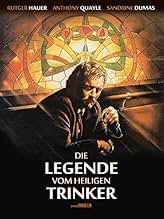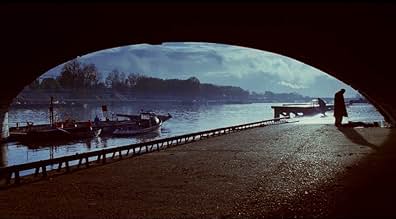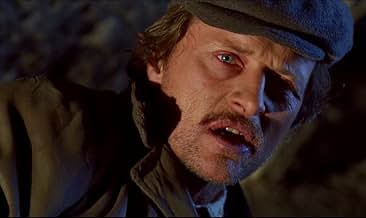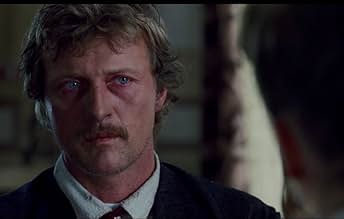IMDb RATING
7.1/10
2.4K
YOUR RATING
An alcoholic homeless man is given two hundred francs by a stranger, who requests that when he can he will return the money to Saint Therese in the cathedral.An alcoholic homeless man is given two hundred francs by a stranger, who requests that when he can he will return the money to Saint Therese in the cathedral.An alcoholic homeless man is given two hundred francs by a stranger, who requests that when he can he will return the money to Saint Therese in the cathedral.
- Director
- Writers
- Stars
- Awards
- 12 wins & 3 nominations total
Francesco Aldighieri
- Policeman
- (as Franco Aldighieri)
- Director
- Writers
- All cast & crew
- Production, box office & more at IMDbPro
7.12.4K
1
2
3
4
5
6
7
8
9
10
Featured reviews
Rutger Hauer at its best!
A great tale with a brillant Rutger Hauer and fatastic music by Igor Stravinsky!
A simple but beautifully executed little tale
This film embraces everything that contemporary Hollywood cinema is so afraid of - intelligence, moral complexity, and rich characterisation. It is a simple tale really - an alcoholic vagrant in Paris is lent 200 francs by a stranger, on condition that he repays it to a local chapel when he can afford it. But what makes this an extraordinary film is the manner in which we are drawn so completely into this seemingly trivial and futile quest. This is principally down to Rutger Hauer's towering performance as the haunted, suffering tramp, who has to battle both ill-fortune and his own past to repay the debt and find peace. There is little in the way of either dialogue or action, yet Ermanno Olmi's vision of a timeless, enchanted Paris is dazzling. A lesson to others in how to tell a story on film.
10duinnuk2
A film which gives the audience time to think.
This simple tale is told at a pace which allows the audience time to reflect within the context of the moral challenges it presents. The result is a level of engagement far superior to the gamut of empty sophistication in the movie world. One is able to explore the implications of the actions and decisions of Hauer's character without leaving the narrative - there is no pressure for post viewing reflection when the spell of the film is broken and thought is coloured by a context inappropriate to the narrative. Here is a complete experience - moving, profound and visually beautiful - if only Hollywood could produce cinema of this standard.
'Through a glass darkly' with Rutger in '87-88
Dutch actor, Rutger Hauer plays the role of a Catholic-Pole and tramp - Andreas Kartack, living in penury in a a timeless Paris. He is approached by a generous dapper gentleman (English actor Anthony Quayle) who gives him 200 francs as long as he donates part of it to a local chapel. An ex-coal miner, in appearance, Kartack sports 'over the ears' wavy fair hair, rheumy eyes, a thin moustache and those tell-tale signs of the coal-mining trade - a rough tough job to say the least- a flat-cap and coal-dust underneath his fingernails. There are shots of him in a Polish mine-shaft and pit-village in an earlier life. He finds work, the company of women and companionship with fellow Poles but is let down by his alcoholism if not sense of stupidity. Based on Lemberg-born Jewish writer Joseph Roth's novel, why the film is poignant is hard to describe - perhaps relating to Slavs/East Europeans exiled from their homelands. The film has a rich spiritual feel, in fact it has that sense of art and spirituality seen in Dostoyevsky's novel, 'The Idiot' featuring the saintly epileptic Prince Leo or Tarkovsky's moving, 'Nostalghia' (1983). Paris seems like an organically glamourous city . For me, this is Hauer's finest performance after his role as the fair-haired French free spirit, Claude Maillot-Van Horn in Roeg's 'Eureka' (1983).
Hauer's Finest Hour
Andreas Kartak is one of life's dispossessed: a tramp, whiling away his days on the streets of Paris. One cold morning, a strange, distinguished gentleman offers him 200 francs, under the proviso that Kartak pay the money back- when he can- to Saint Therese in a nearby cathedral. So begins Kartak's quest to restore honor to his soul and meaning to his life by finding a way to return the money- after squandering it on copious amounts of wine and absinthe.
Based on Joseph Roth's posthumously released story of the same name, Ermanno Olmi's 'The Legend of the Holy Drinker' is a quiet, subtle drama that is moving and entertaining in equal measure. Olmi's restrained direction makes for a very interesting viewing experience. The film relies as much on tone and atmosphere as the screenplay- from Olmi and Tullio Kezich- to communicate the narrative and its' themes. The dialogue is sparse, but meaningful; no words are wasted, nor unnecessary speeches made.
The story is simple yet profound. Kartak's quest takes on a spiritual, epic dimension as he struggles to find his way back into society and to keep his pledge to the distinguished stranger. His character is well-rounded and believable, a man of honor thrust into a situation that would turn most dishonourable. He battles with himself and his principles, not to mention his memories of a past life long left behind; often losing those battles and finding solace in a bottle of cava. Kartak is a character many will see aspects of themselves in: a fascinating, flawed and thoroughly real creation.
The film is beautiful in terms of visuals. Dante Spinotti's cinematography has a rhythmic, mythical quality to it that suits the narrative perfectly. He captures the stark, cold charm of the Parisian streets with real verve and style. Gianni Quaranta's production design is striking and timeless. The film looks like it is set in the thirties, though the time period is never made definitive. His work is rich in detail and adds another dimension of authenticity to the proceedings. The same can be said for Jean-Jacques Caziot and Philippe Turlure's naturalistic set decoration and the inspired costume design from Anne-Marie Marchand.
Rutger Hauer stars as Kartak, delivering a moving, understated performance that is one of the finest he ever gave. His Kartak is a vulnerable man for whom honor and dignity mean the world, though his alcoholism has overtaken his principles. Hauer disappears into the character so thoroughly you genuinely forget you're watching an actor on screen.
Hauer was a performer of great versatility, intelligence and depth- not to mention charm- and he demonstrates that fact here. Though he will likely largely be remembered for his similarly powerful performance as Roy Batty in 'Blade Runner', his work as Kartak is truly magnificent and unaffectedly profound.
The supporting cast deliver generally admirable performances, with Anthony Quayle's as the distinguished stranger being a standout. He brings to the role the right amount of dignity and mystery that leaves an ineradicable impression on the viewer. Joseph De Medina also does good work as an obese hustler Kartak encounters, and Sandrine Dumas is utterly charming as Gaby, something of a love interest for Kartak; but poor post-dubbing of many of these secondary players diminishes the power of their performances, while also lessening the impact of their scenes.
'The Legend of the Holy Drinker' is an affecting film that tells a deceptively simple tale masterfully. As a character study, it works wonderfully, with Rutger Hauer delivering what could arguably be called the finest performance of his career. Director Ermanno Olmi has brought to audiences a memorable, thoughtful film that will surely be beloved by any who care to give it their time. Joseph Roth's stories are notoriously difficult to bring to the screen; this is easily the best adaptation of his work to date. 'The Legend of the Holy Drinker' is quiet, clever and utterly compelling.
Based on Joseph Roth's posthumously released story of the same name, Ermanno Olmi's 'The Legend of the Holy Drinker' is a quiet, subtle drama that is moving and entertaining in equal measure. Olmi's restrained direction makes for a very interesting viewing experience. The film relies as much on tone and atmosphere as the screenplay- from Olmi and Tullio Kezich- to communicate the narrative and its' themes. The dialogue is sparse, but meaningful; no words are wasted, nor unnecessary speeches made.
The story is simple yet profound. Kartak's quest takes on a spiritual, epic dimension as he struggles to find his way back into society and to keep his pledge to the distinguished stranger. His character is well-rounded and believable, a man of honor thrust into a situation that would turn most dishonourable. He battles with himself and his principles, not to mention his memories of a past life long left behind; often losing those battles and finding solace in a bottle of cava. Kartak is a character many will see aspects of themselves in: a fascinating, flawed and thoroughly real creation.
The film is beautiful in terms of visuals. Dante Spinotti's cinematography has a rhythmic, mythical quality to it that suits the narrative perfectly. He captures the stark, cold charm of the Parisian streets with real verve and style. Gianni Quaranta's production design is striking and timeless. The film looks like it is set in the thirties, though the time period is never made definitive. His work is rich in detail and adds another dimension of authenticity to the proceedings. The same can be said for Jean-Jacques Caziot and Philippe Turlure's naturalistic set decoration and the inspired costume design from Anne-Marie Marchand.
Rutger Hauer stars as Kartak, delivering a moving, understated performance that is one of the finest he ever gave. His Kartak is a vulnerable man for whom honor and dignity mean the world, though his alcoholism has overtaken his principles. Hauer disappears into the character so thoroughly you genuinely forget you're watching an actor on screen.
Hauer was a performer of great versatility, intelligence and depth- not to mention charm- and he demonstrates that fact here. Though he will likely largely be remembered for his similarly powerful performance as Roy Batty in 'Blade Runner', his work as Kartak is truly magnificent and unaffectedly profound.
The supporting cast deliver generally admirable performances, with Anthony Quayle's as the distinguished stranger being a standout. He brings to the role the right amount of dignity and mystery that leaves an ineradicable impression on the viewer. Joseph De Medina also does good work as an obese hustler Kartak encounters, and Sandrine Dumas is utterly charming as Gaby, something of a love interest for Kartak; but poor post-dubbing of many of these secondary players diminishes the power of their performances, while also lessening the impact of their scenes.
'The Legend of the Holy Drinker' is an affecting film that tells a deceptively simple tale masterfully. As a character study, it works wonderfully, with Rutger Hauer delivering what could arguably be called the finest performance of his career. Director Ermanno Olmi has brought to audiences a memorable, thoughtful film that will surely be beloved by any who care to give it their time. Joseph Roth's stories are notoriously difficult to bring to the screen; this is easily the best adaptation of his work to date. 'The Legend of the Holy Drinker' is quiet, clever and utterly compelling.
Did you know
- TriviaRobert De Niro was approached for the role of Andreas Kartak, but he turned down the offer because he was not convinced about the project.
- Crazy credits"May God grant all of us, the drinkers, such a light and beautiful death". (Joseph Roth)
- ConnectionsFeatured in Het uur van de wolf: Rutger Hauer: Blond, blue eyes (2006)
- How long is The Legend of the Holy Drinker?Powered by Alexa
Details
- Release date
- Countries of origin
- Languages
- Also known as
- Die Legende vom heiligen Trinker
- Filming locations
- Production companies
- See more company credits at IMDbPro
Box office
- Gross worldwide
- $6,384
- Runtime
- 2h 8m(128 min)
- Color
- Sound mix
- Aspect ratio
- 1.85 : 1
Contribute to this page
Suggest an edit or add missing content
























